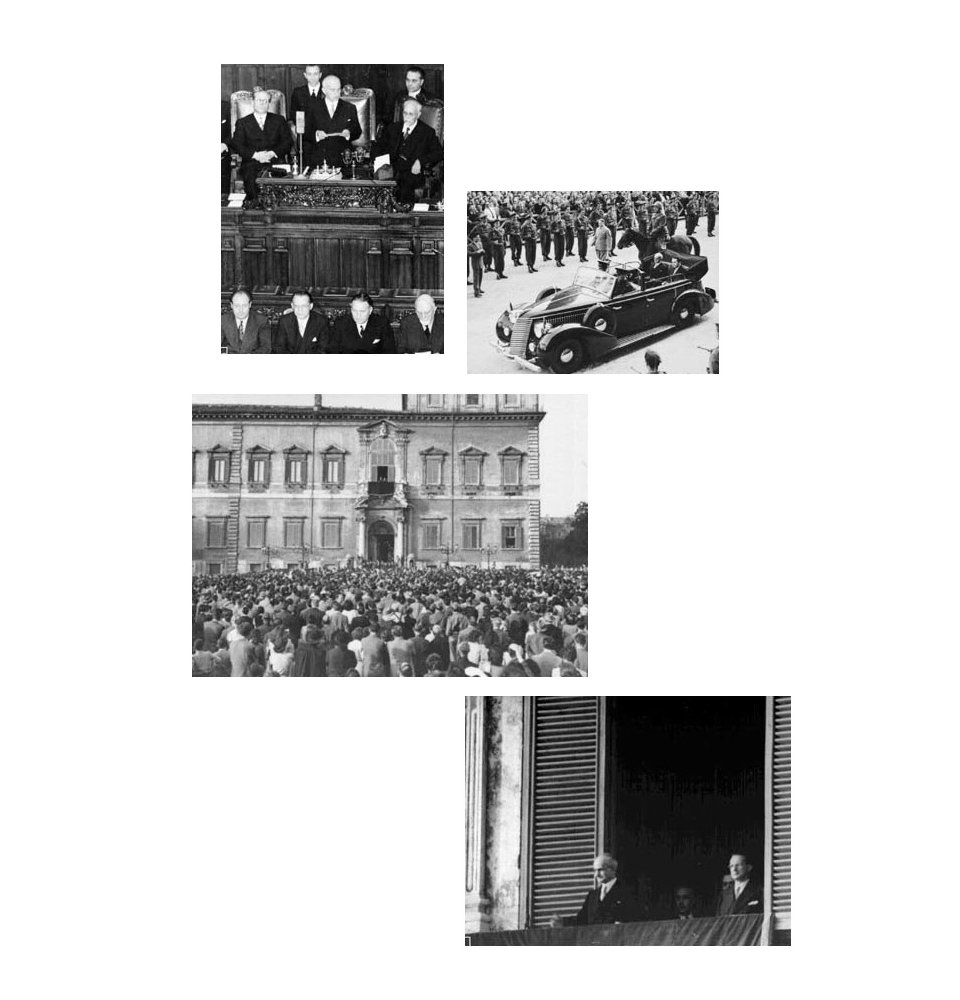Biography of the President
The Early Years: From Childhood to Graduation
"The Einaudis come from the Maira valley, above Dronero1; and
there you can count more Einaudis than stones: since time
immemorial, all mountaineers, woodcutters, shepherds and farmers"
From a handwritten letter by Luigi Einaudi dated 5
September 1953
Luigi Einaudi was born in Carrù (Cuneo) on 24 March, 1874, to Lorenzo
a tax collection service concessionaire, and Placida Fracchia. Luigi
attended his primary school in Carrù and high school in Savona. In
1888, after his father’s death, the family moved to Dogliani, his mother’s
hometown, where he lived in the old family home: "These habits that I
observed in the ancestral home were the universal habits of the
Piedmontese bourgeoisie for much of the 19th century; and at a time
when social climbing was not frequent, one can understand how those
habits moulded a ruling class who left deep traces of honesty, ability,
thrift and devotion to duty in the political and administrative life of the
Piedmont that made Italy...". In 1888, Luigi attended the Classical
Lyceum in Turin. In 1891, he enrolled in the Faculty of Law at the
University of Turin to graduate with full marks in July 1895 with a thesis
on "The Agrarian Crisis in England", supervisor Professor Cognetti de
Martiis.
1 t/n: In the North-West of Italy
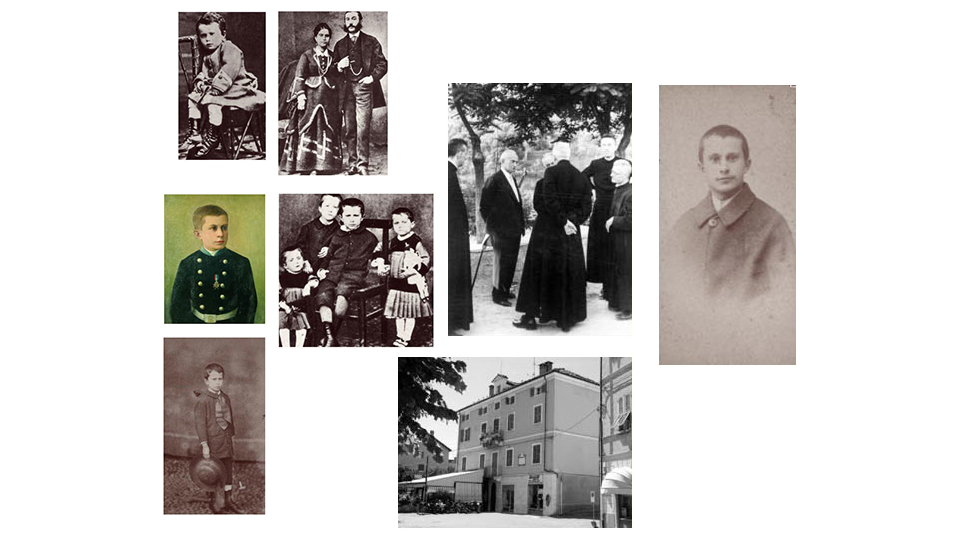
Public and Private Life: Assistant and Professor, Husband and Father
"At the age of thirty-four, Luigi Einaudi was a Public Finance
teacher. He gave lectures at eight o’clock in the morning. He
gathered undergraduates and young economists around him,
many of them would later become Masters ... Rarely have I heard
a word that penetrated so much, lectures whose words are still
remembered more than half a century later".
Arturo Carlo Jemolo, Anni di prova, 1969
After graduating, Einaudi became an "unpaid university professor
assistant". In 1898, he was awarded the certification for teaching
Political economy. In 1899, he won the competition for the Chair of
"Economics, Finance and Statistics" in secondary technical schools. He
taught at the Bonelli then at the Sommeiller secondary technical schools
in Cuneo and in Turin. In the meantime, he began his university career
on an independent teaching. In 1902, at the age of 28 only, he won the
competition for Public Economics called by the University of Pisa. There,
he was appointed professor of Public Economics and Financial Law
under a temporary contract before being transferred to the Faculty of
Law at the University of Turin, which was to become his permanent post.
On 19 December 1903, Luigi married Ida Pellegrini in Turin. She was
the eighteen-year-old daughter of a nobleman from Verona who had
moved to Turin on business. Three children were were born from the
marriage, Mario (1904), Roberto (1906) and Giulio (1912) as well as
Maria Teresa and Lorenzo who died prematurely.
The family split their time between Turin and Dogliani, a place in the
countryside where Luigi had bought the S. Giacomo farmhouse, the
basis of a property which he extended and improved over the years.
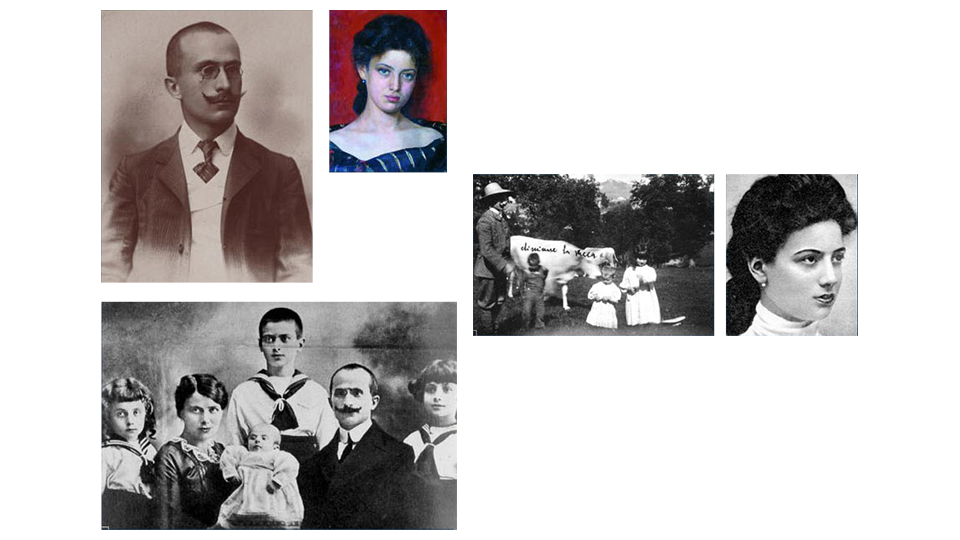
The Scholar of Economic History and Finance Law
Italian economics "was second to none". The book Principi di economia
pura by Maffeo Pantaleoni (1889) constituted the "point of reference - a
gem". Barone "showed Walras how to do without the constant
coefficients of production". "The kind of general economics that may be
represented by the work of Luigi Einaudi". "Finally we reach that peak
which was Pareto".
Joseph A. Schumpeter, History of Economic Analysis, 1954, Vol. III, Ch. V2
Einaudi’s first book, "Il Principe mercante" (The merchant prince) was
published in the year 1900. There, Luigi Einaudi drew the portrait of a
successful Italian textile entrepreneur. The young liberal scholar praised
the work of Italians who had "come up through hard work and courage,
from humble labourers, to prominent economic positions". He magnified
"self-made men" who were the "living embodiment" of "intellectual and
organisational qualities", those "eminent individualities who were able to
[emerge] from the grey and anonymous crowd by greatness of intellect,
by daring enterprise or even by a fortunate combination of favourable
circumstances". In 1900, he also published "La rendita mineraria" (The
mining income), a challenging study published within UTET’s prestigious
"Biblioteca dell’economista" (Economist’s Library). In 1902, he
published his third monograph: "Studi sugli effetti delle imposte.
Contributo allo studio dei problemi tributari municipali" (Studies on the
effects of taxation. A contribution to studying Town taxation issues). All
these writings ensured that, by the early 20th century, young Einaudi not
yet in his Thirties years of age,was an established exponent of the most
prominent Italian economic science, particularly in the field of Fiscal
Finance. Together with Pantaleoni, Pareto, Barone, de Viti de Marco and
Ricci, he was and would remain one among the Italian economists
deserving international prestige. In the years that followed, he
conducted important research on the History of finance under the Savoy
monarchy as well as studies on Financial Law: "Intorno al concetto di
reddito imponibile e di un sistema di imposte sul reddito consumato" of
1912, (Around the concept of taxable income and of a taxation system
based on consumed income) a fundamental work on the core of issues
he had been addressing since 1909 on the topic of earned and
consumed income; and "Corso di Scienza delle finanze" (Course on
Financial Law)Cof 1914. Thanks to the sound reputation he had
acquired, Einaudi collaborated as a columnist first with "La Stampa"
(from 1896), then with Corriere della Sera (from 1903); in 1908, he
began a collaboration with The Economist which went on until 1940.
2 t/n: quotations from http://digamo.free.fr/schumphea.pdf
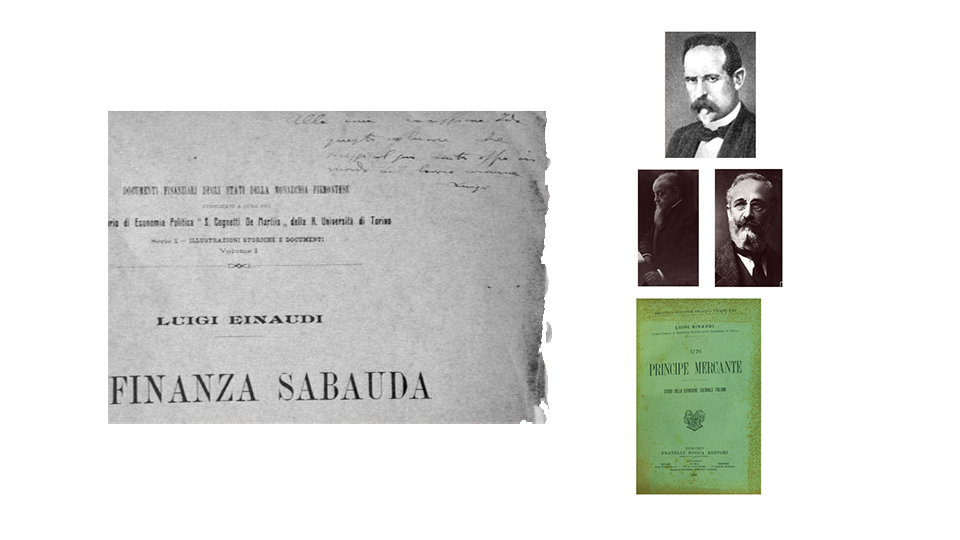
The "Social Reform" and the "Turin School of Economics
"Without changing its name, "Riforma Sociale" gradually changed
its orientation; it began appreciating more the classical economy
and, while not neglecting the problems of reforms in the
distribution of wealth, it began insisting more on the problems of
convenience in production and the fight against the many kinds of
protections, constraints and monopolies …"
Luigi Einaudi, Preface to Francesco Saverio Nitti, Scritti sulla questione meridionale, 1958
In 1908, Einaudi became the editor of "Riforma Sociale". The journal
had been founded in 1894 by Francesco Saverio Nitti and the Turin
publisher Luigi Roux. They intended to give their contribution in tuning
the Italian liberal institutions to the dynamics and conflicts of the
emerging industrial society. Under Einaudi’s guidance, "La Riforma
sociale" proclaimed a liberal, classical and reform-oriented vision at the
same time, a legacy from the great English and Italian tradition of John
Stuart Mill and Cavour. An entourage of valuable collaborators built up
around Einaudi. They would become the core of the "Turin School of
Economics" whose doctrine and originality would receive wide
recognition in the following years. Together with Pasquale Jannaccone
and Giuseppe Prato, respectively co-director and editor-in-chief of "La
Riforma Sociale", Attilio Cabiati joined the school when moving to Turin
at the beginning of the century.
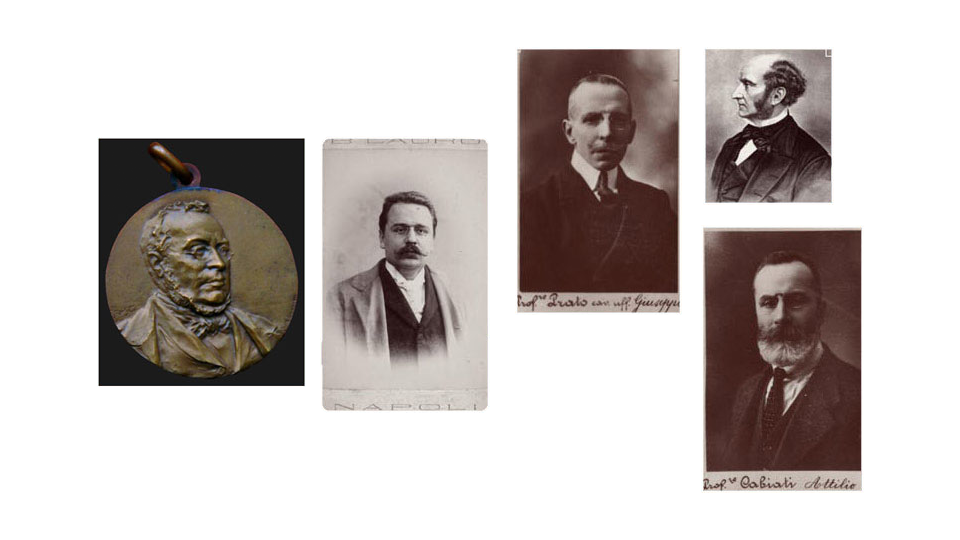
From the Great War to Fascism: 1914-1926
"Woe betide whomever fell from the natural aspiration to liberate
from the bestial civil war into which the political struggle of Italy
had degenerated between 1919 and 1921, into absolute
conformity to the nationalistic gospel imposed by fascism without
contrast! This would be the death of the nation".
Luigi Einaudi, Preface to J. S. Mill, Liberty, 1925 3
At the outbreak of World War I, Luigi Einaudi was on the interventionist
side of the Entente. In this period and in the immediate post-war period,
Einaudi’s thinking was characterised by a strong ethical and political
tension and by a particular focus on international issues. Two famous
collections bear witness to this: the "Lettere politiche di Junius" (1920)
(Junius political letters) and "Gli ideali di un economista" (1921) (The
ideals on an economist), where he outlined his "ideals": "the educational
school, England, the unification of Italy through the history of Piedmont,
the need for supernational governments". During the war, Einaudi was
called by Filippo Meda, the Finance Minister in the Boselli government
to take part in a parliamentary commission charged with the study and
preparation of the tax reform. He played a primary role in the drafting of
the project, which however was not implemented. On 6 October 1919,
he was appointed Senator of the Kingdom at the proposal of the Prime
Minister Francesco Saverio Nitti. One year later, he was appointed
director of the Institute of Economics and Social Sciences at the Luigi
Bocconi University in Milan, a post he held until 1926. The "biennio
rosso" (1919-1920) characterised by the revolts by peasants and
workers to occupy land and factories was interpreted by Einaudi as a
period of regression of "civilisation" and laceration of the social fabric. In
this context, Einaudi hoped that fascism would restore order. He shared
with other liberals the illusion that the new regime could then be brought
back into the structure and institutional dynamics of the liberal state. At
the end of 1923 "La bellezza della lotta" (The beauty of struggle) was
published: an effective synthesis of Einaudi’s liberalism to preface "Le
lotte del lavoro" (1924) (Struggles for labour). After Giacomo Matteotti
was murdered, the political situation deteriorated quickly in Italy. On 6
August 1924, Einaudi launched his cry of alarm in the article "Il silenzio
degli industriali" (The silence of industrialists). On 5 December, he voted
against the draft budget of the Ministry of the Interior for the 1924-25
fiscal period. In 1925, he published the Preface to John Stuart Mill’s
Freedom. There, he warned: "Woe betide whomever fell without
contrast from the natural aspiration to liberate from the bestial civil war
into which the political struggle of Italy had degenerated between 1919
and 1921 into absolute conformity to the nationalistic gospel imposed by
fascism! This would be the death of the nation".
On 1 May 1925, the Manifesto of Anti-Fascist Intellectuals drafted by
Benedetto Croce was published. Einaudi was among the first
signatories. On 28 November, he resigned as a contributor to the
Corriere della Sera following Luigi Albertini’s forced resignation from the
editorship and the new ownership of the newspaper by the Fascist-
friendly "F.lli Crespi e C.". In 1926, he was ousted from teaching at
Bocconi and at Polytechnic of Turin, again for political reasons.
3 t/n: in the Italian version of the text
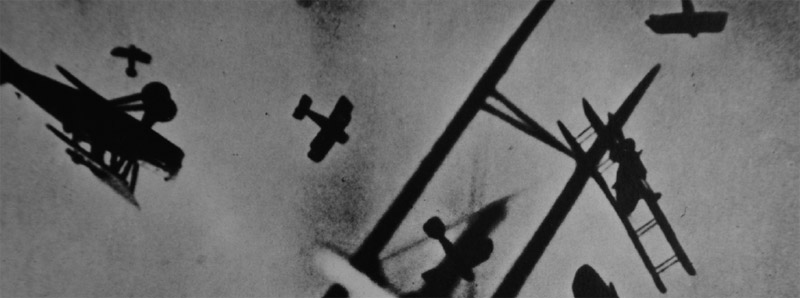
A Professor Kept on the Edge, a Senator on the Sidelines
"In a way, Fascism is the result of the weariness which had gone
growing into the souls of the Italians after the long and furious
infighting in the post-war period. It is an attempt to regiment the
nation under one single flag. Souls yearned for peace, tranquillity,
rest. They were appeased by the word of those who promised
these goods".
Luigi Einaudi, Preface to John Stuart Mill, Freedom, Turin 1925 (Italian version)
In 1925 -1926, the regime forced Einaudi to sever two of his main
channels of communication with his audience: his collaboration with the
Corriere della sera, following the ousting of the Albertinis, and his post at
Bocconi where he had been teaching since 1904. He retained his
university professorship in the Faculty of Law in Turin, but to keep it he
had to submit to the odious obligation of swearing an oath of loyalty to
the regime imposed in 1931. Like many other anti-fascist professors, the
decision cost him no small torment. He went to Naples to see Benedetto
Croce who advised him to take the oath because otherwise he would be
replaced by a professor of fascist faith, and the students would be
educated in that faith. In the Faculty where he taught, Achille Loria and
Gioele Solari who were his friends and who had always sided with
reformist socialism also swore in this spirit.
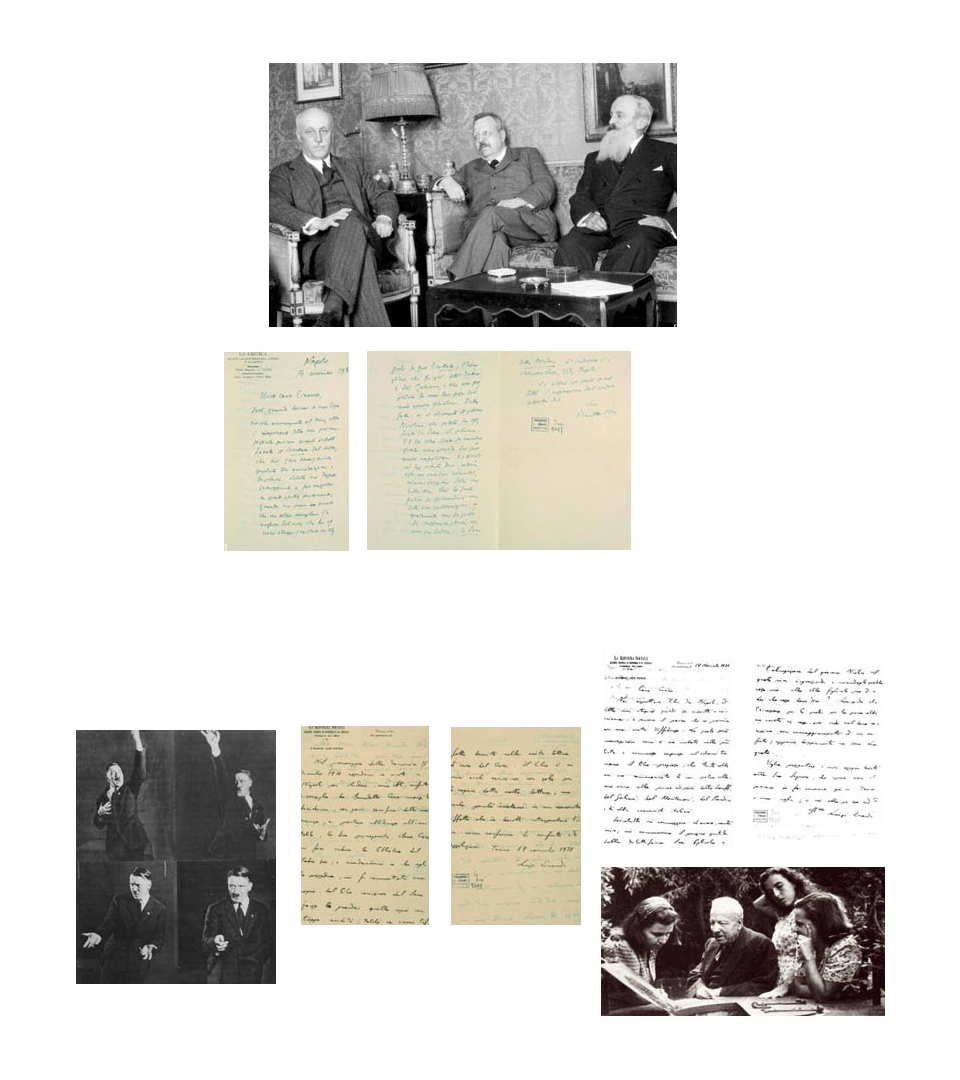
The revival of the Riforma sociale and the Rivista di storia economica
"When facing real problems, the economist can never be either
liberalist, interventionist, or socialist whatever it takes; ... The free
man wants the State to intervene, just as the wise legislators of all
times and all countries have always intervened."
Luigi Einaudi
After 1922, the Riforma was seemingly losing its attractiveness. After he
was forced to leave Corriere della Sera, Luigi Einaudi threw himself
headlong into the task of giving a new thrust to Riforma. He acted in the
simplest way: by writing a whole set of articles on the Fascist monetary
policy in the second decade of the century. Actually, he shared the
strategy since inflation had been curbed and the exchange rate at
"quota 90" 4 had been successfully preserved. In the 1930s, came the
articles on the international economic crisis, the interventions on Keynes
and those on corporatism. In the three years following, the journal
became more pleasant to leaf through for the good taste of his son
Giulio who had become a publisher. Colourful Olivetti advertising had
been added together with a new modern printing style. With the closure
of Riforma Sociale in 1935, the regime cut short the life of a living,
breathing creature. Tirelessly, Einaudi founded the "Rivista di storia
economica" in 1936 (Review of economic history), with old and new
contributors. Through this erudite review, he continued to intervene on
contemporary problems, albeit indirectly and allusively.
4 t/n: in the fascist period Mussolini negotiated exchange rate 1£=90 Lit - before that was 1£=150Lit
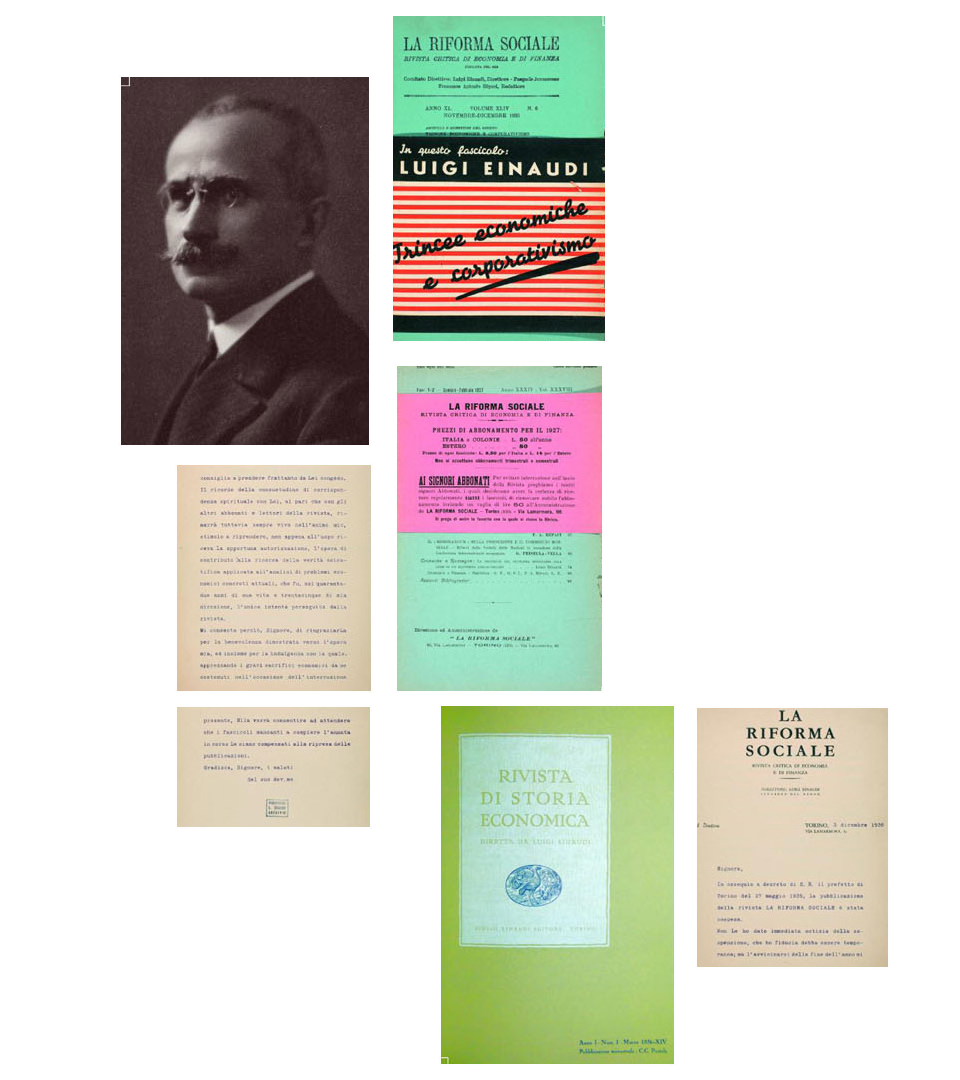
The Exile, across the Alps
The drama of the war and the consequent fall of Fascism created the
conditions for Einaudi to be reinstated to public life, even if only for a
short period. On 4 September 1943, during the 45 days of the Badoglio
government, Einaudi took up the post of dean at the University of Turin.
But already on the 22nd of that month, hunted by the Nazi-Fascists
occupying the North, he and his wife were forced to make a perilous
escape across the Alps. His diary maintains an impassive tone.
However his narrative is really engaging. At the border of Col Fenêtre,
he risked to be rejected: he was extremely cool when he told who he
was and gave he the name of his colleague from the University of
Geneva, William Rappard. The next day, they were in Martigny and then
in Lausanne. Also, they were blessed with the joy to meet their son
Giulio at the refugee camp where they had settled. This one had
crossed the border on 15 September, an officer in the Alpine troops. The
refugee Einaudi was no ordinary person. He soon left the Orphélinat
refugee camp. From Lausanne, the couple moved on to Basel in a small
flat where Margherita, the widow of one of Roberto Michels’s sons
hosted them. Luigi and Ida made a virtue out of necessity. Margherita
was a concert pianist, and perhaps for the first time in his life, Einaudi
approached chamber music with delight even though Cabiati jokingly put
it: "he founds the Royal March complicated". In April 1944, they moved
to Geneva.
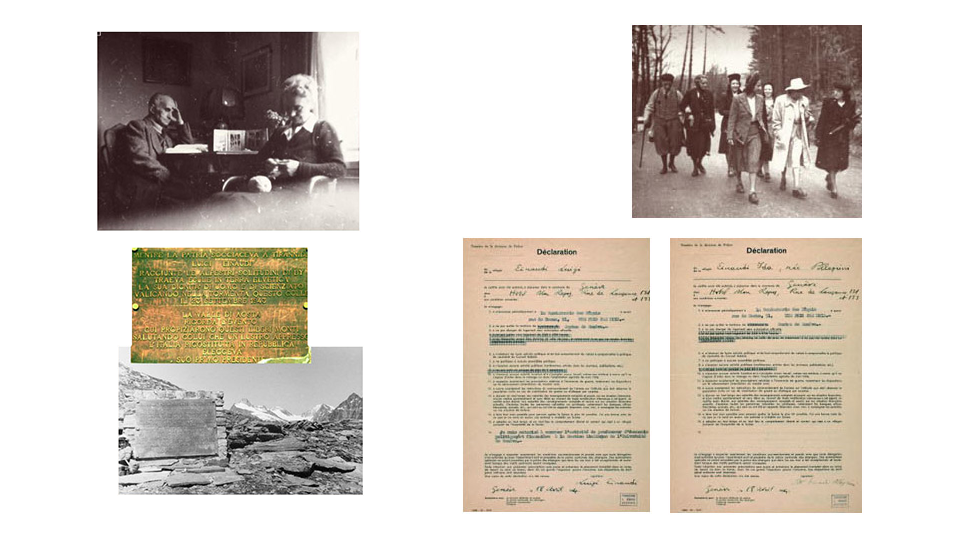
The Swiss Experience
Over forty years earlier, Einaudi had been close to obtaining a chair in
Political Economy as Maffeo Pantaleoni successor in Geneva. Now, by
to his peer Rappard, he met some of the major Swiss intellectuals such
as the historian Werner Kaegi and the economist Edgard Salin. Roepke
taught in Geneva, at the Institut des hautes études internationales.
Another leading figure was the Swiss Plinio Bolla, promoter of a Comité
d’aide aux universitaires italiens en Suisse. In March 1944, Einaudi gave
a course to the Geneva university inmates, from there he derived the
bulk of the "Lezioni di politica sociale" (Lessons of social politics) of
1949. The most stimulating meetings were with Italians, first and
foremost Adriano Olivetti and Ernesto Rossi, a convinced federalist and
author with Altiero Spinelli of the Manifesto di Ventotene . Einaudi had
reservations about the radical tone of the Manifesto. Nevertheless, in his
article "Via il prefetto!" - published on 15 July 1944 in the supplement to
Gazzetta ticinese with the inspiring title "Italy and the Second
Risorgimento" - he expressed a condemnation without appeal against
the centralised and "Jacobin" state inherited from Napoleon, just as he
put an important assessment of the partisan movement, because of
those "bourgeois" who set out to reform the state from the bottom. The
immediate political contingency was not absent either: Einaudi was, in
fact, contacted by Maria José of Savoy to organise monarchist
propaganda, with a view to the institutional referendum once the war
would be over.
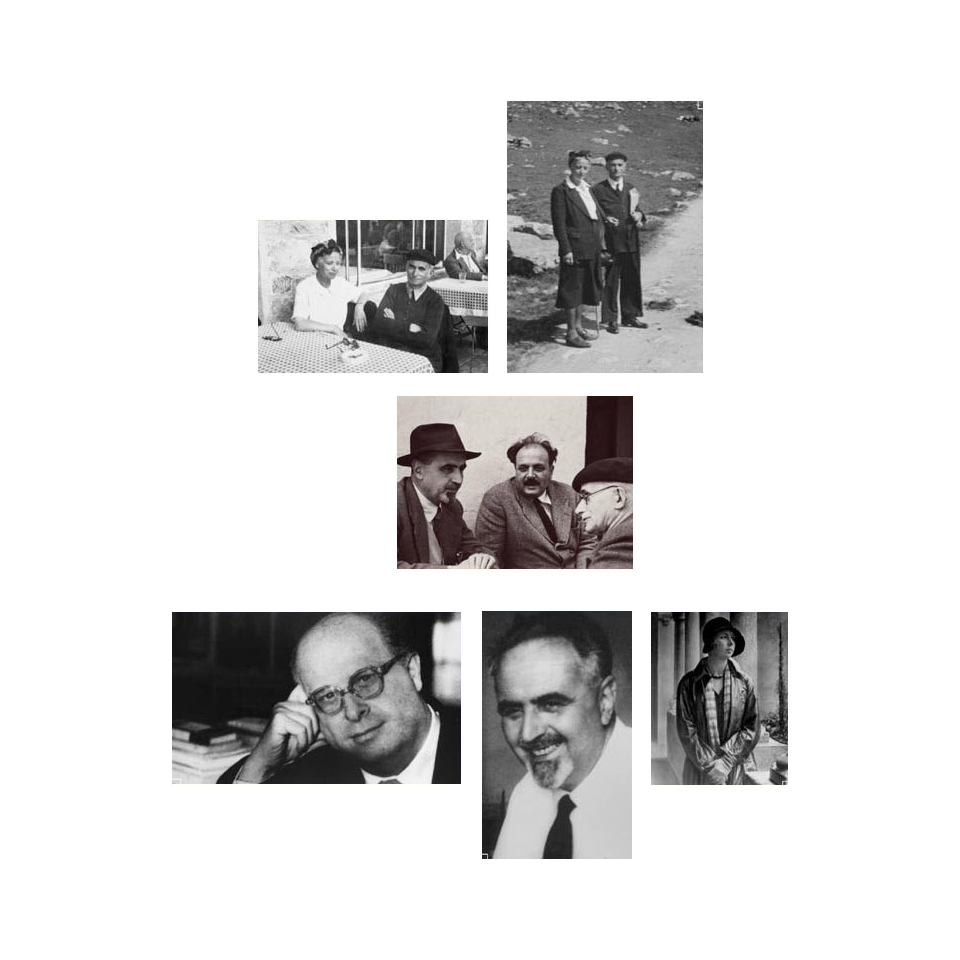
At the Helm of the Bank of Italy
Back to Italy, on 10 December 1944, Einaudi took up the post of
Governor of the Bank of Italy in early 1945. The country was facing
enormous problems. Inflation had exploded after the armistice of 8
September 1943 and the pricing system had broken down: between the
North and the South of the Country, between the city and the
countryside, between official prices and the black market. After the
Liberation, even if damage to manufacturing facilities seemed small,
damage to housing, to the transport and agriculture was enormous.
Even the Bank of Italy came out of the war impoverished in its assets
and with a weaker inner structure. The restoring of sovereignty and
monetary stability, the financing of reconstruction, the re-introduction of
the Lira and of the Italian economy into the new global context were the
major issues to be faced by Einaudi at the helm of the Bank of Italy and
then of the Government. Within his action, each one of these issues is
tied to his concern to restore an economy and a state being at the same
time the founder and the foundation of freedom for citizens.
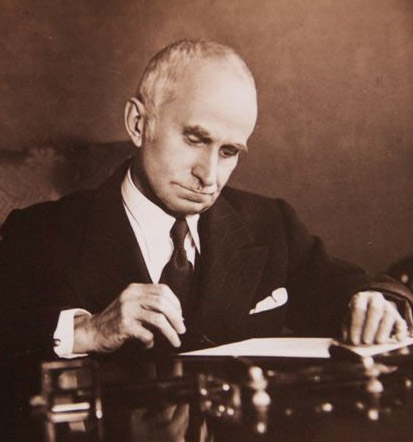
The Rebirth of the Italian Parliament
After the Liberation, Luigi Einaudi was appointed a member of the
Consulta Nazionale. Later, in June 1946, he was elected to the
Constituent Assembly as a Liberal in the list of the National Democratic
Union. Within the Constituent Assembly, he was a member of the
Commissione dei 75 - in charge of drafting a preliminary version of the
Constitution - and in the sub-commission on the constitutional order of
the State. On 31 May 1947, he joined De Gasperi fourth government as
Vice-President of the Council and Minister of Finance and the Treasury;
a few days later, on 4 June, he was replaced at the Finance by
Giuseppe Pella and at the Treasury by Gustavo Del Vecchio, to became
the holder of the new Ministry of the Budget while retaining his position
as Governor of the Bank of Italy. Einaudi’s parliamentary activity at the
Consulta and in the Constituent Assembly supported the transition from
Monarchy to Republic even if in the 1946 election campaign Einaudi
was in favor of the king due to his sub-alpine origin and also for reasons
of constitutional balance. As he was to recall after his election to the
Quirinal, Einaudi gave dozens of speeches to the Constituent Assembly
with "something more than loyal support". In his speeches to the
Consulta and the Constituent Assembly, Einaudi dealt with institutional
issues (electoral system, bicameralism, local autonomies), economic
and social issues (taxation system, international monetary system,
planning, monopolies, education), and international issues (Europeism
and peace). Even though Einaudi had been initially opposed to the very
idea of a Constituent assembly, he later realized in the passionate
debates that all this exercise proved not only the evidence of maturity in
the reborn Italian democracy, but also the effectiveness of dialectical
dispute when thinking is the creative factor for political debate together
with social conflict and competition in the economy.
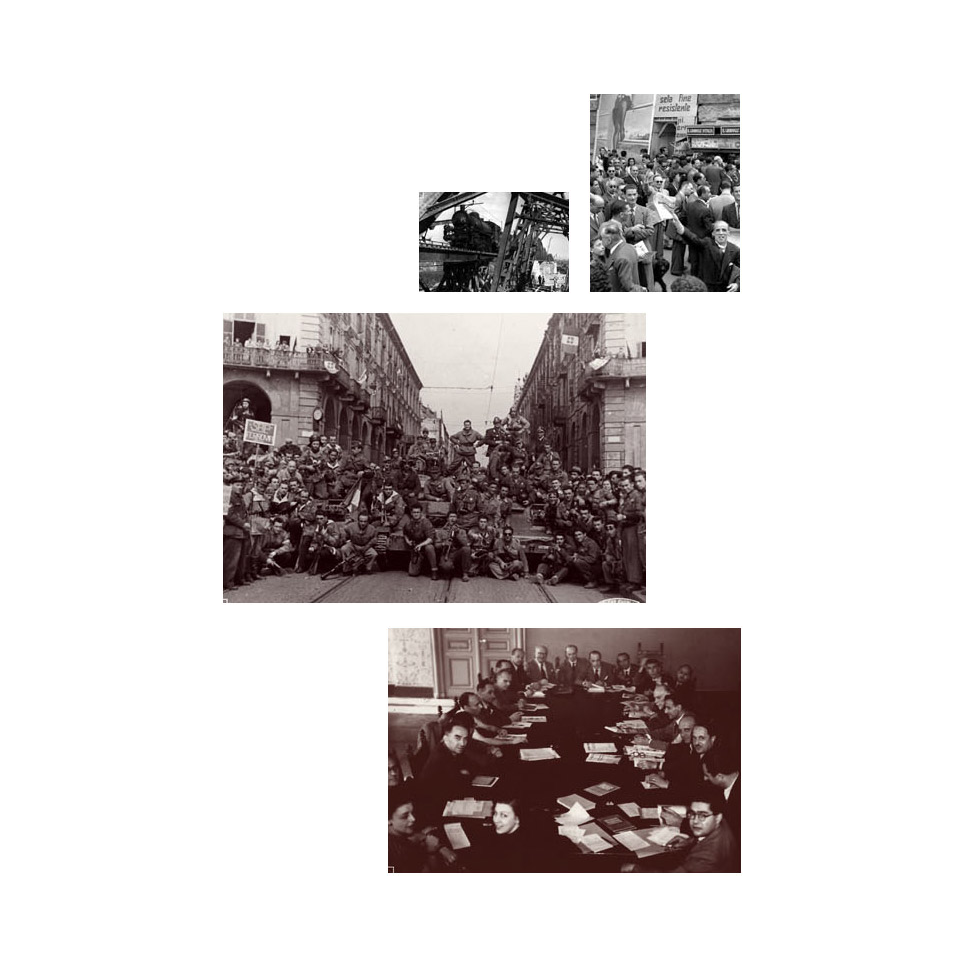
The President of the Republic
Luigi Einaudi was elected President of the Republic on 11 May 1948 at
ballot four, with 518 votes from the Christian Democrats, the Social
Democrats, the Liberal Party and the Republican Party. The Socialists
and Communists supported Vittorio Emanuele Orlando who casted 320
votes. In his swearing-in speech, Einaudi wished to emphasize that the
difficult present derived from a dramatic past: "Twenty years of
dictatorship had served the country with civil discord, external war
together with material and moral destruction to the Fatherland to such
an extent that any hope of redemption seemed vain. And instead, all
these sufferings re-elaborated in the Resistance led to protecting "the
indestructible national unity from the Alps to Sicily", while the
reconstruction of the "destroyed material fortunes" was beginning. Along
the lines marked out by the Constitution, he emphasized the central role
of the Parliament, the place where "true life is, the very life of the
institutions that we freely gave to ourselves" and the need to pacify
souls after the mid-century disaster. With the election of Einaudi,
certainty was given to the organization of presidency: a special Act of
Law defined its endowment and established the General Secretariat of
the Presidency of the Republic, headed by Ferdinando Carbone from
1948 to 1954 , and by Nicola Picella from 1954. In interpreting and
carrying out his function, Einaudi adhered to a profound respect for the
dialectics between the political and the parliamentary forces.
At the same time, within such established boundaries, he exercised the
powers that the Constitution assigned to the President. He claimed and
used the prerogatives that the Constitution had ascribed to the President
of the Republic, even if this could mean on some issues, such as the
power to choose senators for life and constitutional judges, some
contrast with the majority which had elected him. During the years of
Einaudi’s presidency, Italy healed the wounds of the war, made the
fundamental choices for its international position by joining NATO and
the rising European institutions, brought Trieste back in the national
borders, and launched a vast modernisation of economic facilities. After
his term of office ended, Einaudi published Lo scrittoio del Presidente
(The President’s writing desk), a volume collecting letters, memoirs,
observations, and proposals for modifications suggested by the
legislative texts submitted by the government. In the years following
1955, he also published Le Prediche inutili (1959) (Useless preaching)
and many other articles in reviews and newspapers which testify to the
fruitful intellectual activity carried out by Luigi Einaudi until his death in
Rome on 30 October 1961.
